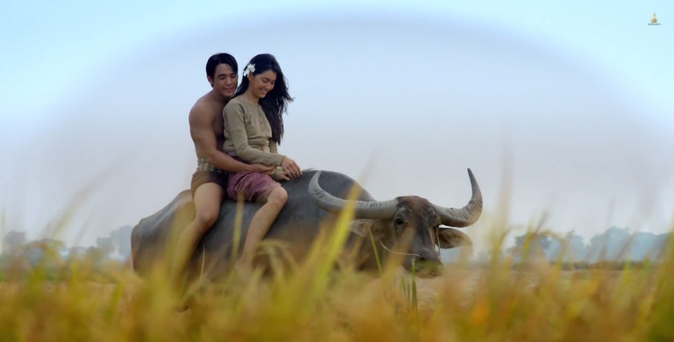“Riam, I love you so much my heart aches,” Kwan whispers to his true love Riam, as they dive into another world beneath the Saen Saeb canal, an out-of-sight place where their young love isn’t forbidden.
For audiences who enjoy having their heartstrings toyed with, this moment in the film’s telling of a well-loved story of the first moment its protagonists fearlessly express their true feelings solidifies its place early on as a worthy remake, even if it’s the fourth such effort.

Set in the wide golden rice fields of Bang Kapi in 1936, “Plae Kao” or “Scar,” is the latest visualization of the kingdom’s most famous Romeo and Juliet-style legend. Kwan (Jan Dara 2’s Chaiyaphol Julien Pupat) and Riam (Pee Mak’s Davika Hoorne) come from feuding households on different sides of canal. Because of their fathers’ quarrel, they are told to never fall in love, but like any story featuring forbidden fruit, it’s not long before it’s sweetness is tasted.
The two secretly meet at the village’s banyan tree shrine, where they swear to love each other until separated by death.

As if to test their vows, Riam is sold into the service a rich woman to settle the family’s debts. Madame Thong Kham Pleo (The ever-awesome Sinjai Plengpanit), who adores her dead daughter’s image in Riam, transforms her into a Bangkok aristocrat with proper education and social graces. In leather high heels, Riam returns to Bang Kapi, where Kwan still awaits the return of the girl he remembers.
Based on an original screenplay by Mai Muangderm, the latest remake of Plae Kao is a masterwork effort from director M.L. Pundhevanop Dhewakul, best known for the third and fifth installments of the “Jan Dara” series and “Eternity.” Pundhevanop handles the story’s uncompromising romantic idealism with a clear intent not to diminish it.
Sure, audiences of our post-sincerity age may want to smirk at the lovers’ dialogue and ask how it could be believable, yet that’s what Kwan and Riam represent – the irrational, full-hearted embrace of romantic love. Not the reality.

While the story focuses on its unreal aspects, the period setting of the ‘30s is well visualized. While Bang Kapi has no electricity and a culture that appears frozen hundreds of years prior, Bangkok is lined with concrete roads and imported cars carrying foreign-educated Thais in suits and leather shoes. The Bangkok setting looks very much how we romantically imagine Ratchadamnoen Road did in its glory days at the outset of the country’s modern age, new paint smell and all.

That pressure to modernize is given passing reference in a party scene where three dolled-up performers sing about how “hats mean civilization,” reflecting the Western-pushing Cultural Mandates of Prime Minister Plaek Phibunsongkhram.
The movie contrasts that with Bang Kapi’s earthy “Rice Harvesting Song,” a flirtatious, call-and-response folk song adapted to create a romantic dance for Kwan and Riam. Instead of the rice field, the singing takes place at the village’s temple allowing more participants to join in the scene.
The film’s vintage appeal is enhanced by its soundtrack. Since it’s first inception in 1940, each remake of the film has featured updated renditions of the same songs by the contemporary artists-of-the-moment. The same is true for the latest and its timeless tunes such as Saen Saeb, By Riam’s Side (reimagined by Napat Injaiuea), and My Kwan (Wichayanee Pearklin). The lyrics are well-translated and non-native speakers won’t choke on any conflict with the dialog’s subtitles.
Through the fault of directing or lack thereof, Chaiyaphol and Davika exaggerate their portrayals to a fault, perhaps in keeping with the film’s time-frozen ideals. With secondary characters known from reality television show “The Stars” appearing as the couple’s friends, the audience is frequently pulled out of the moment and reminded their watching a 2014 movie about a love story and not a real love story.
The new adaptation of Plae Kao provides a telling perspective on the story by valuing its idealism and lifting it above the truth. Maybe the directors thinks the Kwans and Riams have died out from the world. Maybe there’s some yearning for what’s believed to be a less complicated past. Find out for yourself. Plae Kao is in theaters now, and is recommended at least for its feels-heavy moments and reminder of that one time you felt the love of your life, before you knew better.
Plae Kao is in theaters now and is rated G. Screenings are available with English subtitles at some theaters. Check listings.
Photos: Sahamongkolfilm International





Reader Interactions